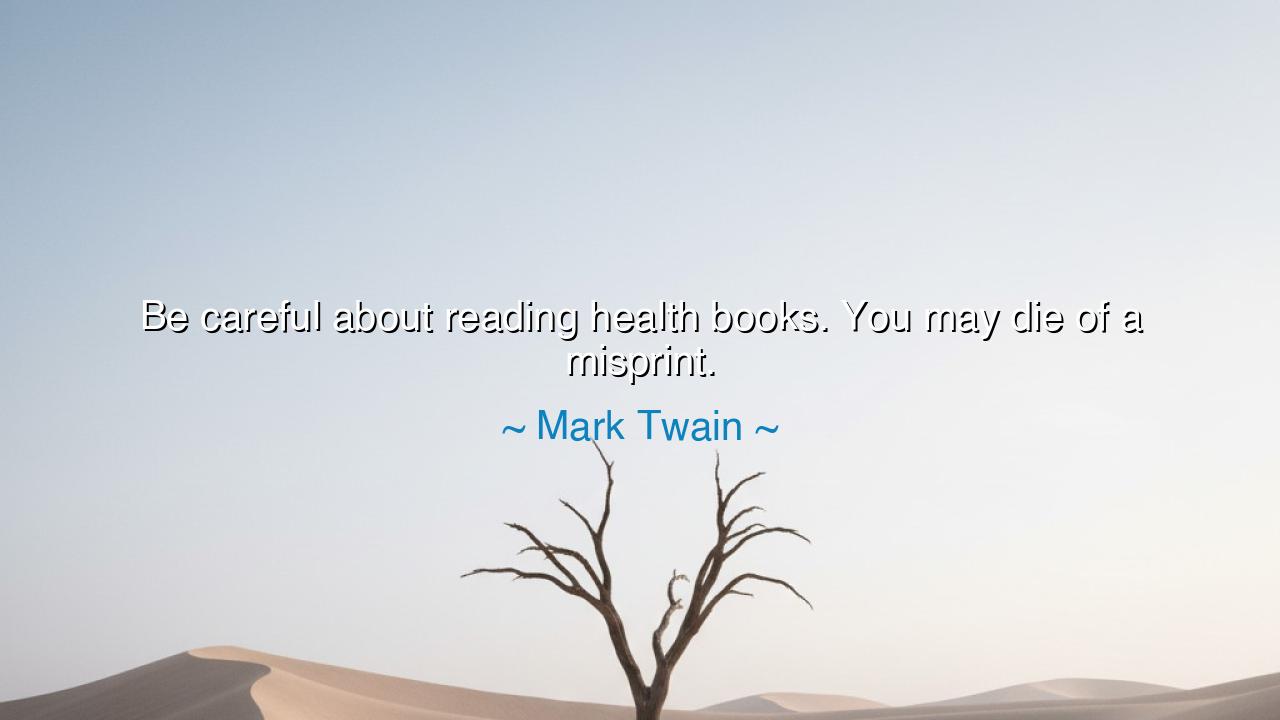
Be careful about reading health books. You may die of a misprint.






In the sharp, witty, and timeless voice of Mark Twain, the great American sage, there lies a warning cloaked in humor: “Be careful about reading health books. You may die of a misprint.” To the untrained ear, this may sound like mere jest — a playful strike at the eccentricities of the human race. But beneath its laughter burns a deeper wisdom: a lesson about discernment, skepticism, and the peril of blind faith in authority. Twain, who saw the folly and beauty of humankind with equal clarity, reminds us that truth is not found merely in words on a page, but in the reason and balance within our own hearts.
In his age, as in ours, the world was brimming with cures, diets, and doctrines promising salvation in a bottle or a theory. The nineteenth century — an era of invention and exploration — also birthed countless “miracle tonics,” often brewed from more poison than medicine. Twain, ever the observer of human absurdity, saw that people often chase health with such desperation that they lose both reason and sense in the pursuit. To “die of a misprint” is his satirical way of saying: beware the blind acceptance of untested wisdom, for even a small error, when trusted without thought, can lead to ruin. The quote stands as a shield of laughter against the dangers of credulity — the ancient human weakness of believing without understanding.
To Mark Twain, humor was a vessel for truth. He believed that laughter could pierce folly more deeply than anger ever could. His quip about health books is not just a criticism of quack medicine, but a broader parable about knowledge and trust. In every age, mankind has sought healing — physical, moral, and spiritual. But too often, in this noble quest, we surrender our judgment to those who promise certainty. Twain reminds us that true wisdom is not in memorizing what others say, but in testing, observing, and thinking for oneself. “Trust yourself,” he seems to whisper through his laughter, “for the body, like the soul, speaks truth if you only listen.”
This lesson echoes far beyond Twain’s America. The ancients, too, warned of this danger. The philosopher Socrates taught that the unexamined life is not worth living — not because it lacks pleasure, but because it lacks understanding. The physician Hippocrates, father of medicine, insisted that observation and balance, not superstition, were the true paths to health. Even in the East, Confucius cautioned his followers to seek harmony, not obsession, in all things. Twain, through his jest, joins their chorus: that knowledge without wisdom is peril, and information without reflection is chaos.
Consider the tragic story of Radithor, a “miracle medicine” sold in the early 1900s, marketed as “liquid sunshine” and a cure for fatigue. It contained radioactive radium — a poison disguised as vitality. Those who trusted the labels and testimonials consumed it faithfully, until their bones decayed and their bodies failed. Among them was the wealthy industrialist Eben Byers, who, in his zeal for health, became its victim. “He had much of Radithor,” the papers said, “and it had him.” In that tragedy, Twain’s humor becomes prophecy. The people who sought life through blind belief found death through misplaced trust. Thus, his laughter carries the weight of warning: to seek health, one must also seek wisdom.
The true meaning of Twain’s saying, then, lies in balance — the balance between curiosity and caution, between trust and questioning. Books, teachers, and healers can guide us, but they cannot replace the inner compass of reason. For every age produces its share of false prophets — those who promise healing, happiness, or enlightenment, yet sell only illusion. The wise learn to read with the eyes of discernment and to live with the strength of independent thought. Twain’s humor, like a lantern in the dark, reminds us that laughter and skepticism are both forms of protection — guards against the madness of crowds and the seduction of certainty.
The lesson is this: seek truth, but question everything. When reading — whether a health book, a doctrine, or a promise — pause and listen to your own experience. The body, if treated with respect, often knows more than the printed word. Nourish it with simplicity, move it with gratitude, and rest it with peace. Let books be companions, not masters. And remember that wisdom, unlike dogma, breathes — it grows, shifts, and adapts, as life itself does.
So, let the laughter of Mark Twain echo through the ages as both jest and jewel: “Be careful about reading health books. You may die of a misprint.” For though the line makes us smile, its truth should make us pause. In a world overflowing with information, the wisest act is not to read more, but to think more — to question, to test, to feel, and to live by one’s own experience. For health, like truth, cannot be printed; it must be practiced, discerned, and lived. Thus speaks Twain — with laughter on his lips and wisdom in his soul — urging us to guard both our minds and our bodies from the peril of unexamined belief.






AAdministratorAdministrator
Welcome, honored guests. Please leave a comment, we will respond soon